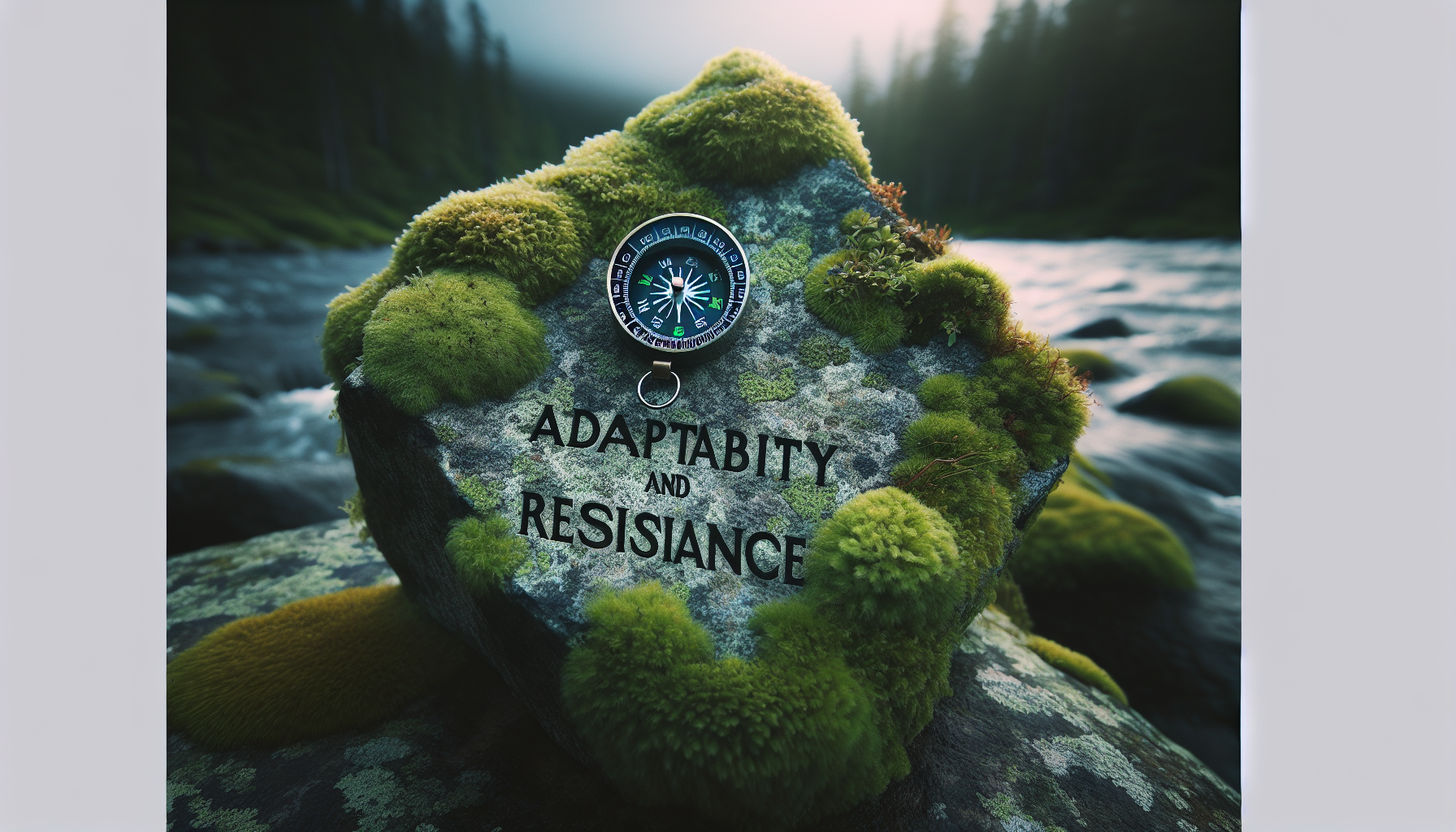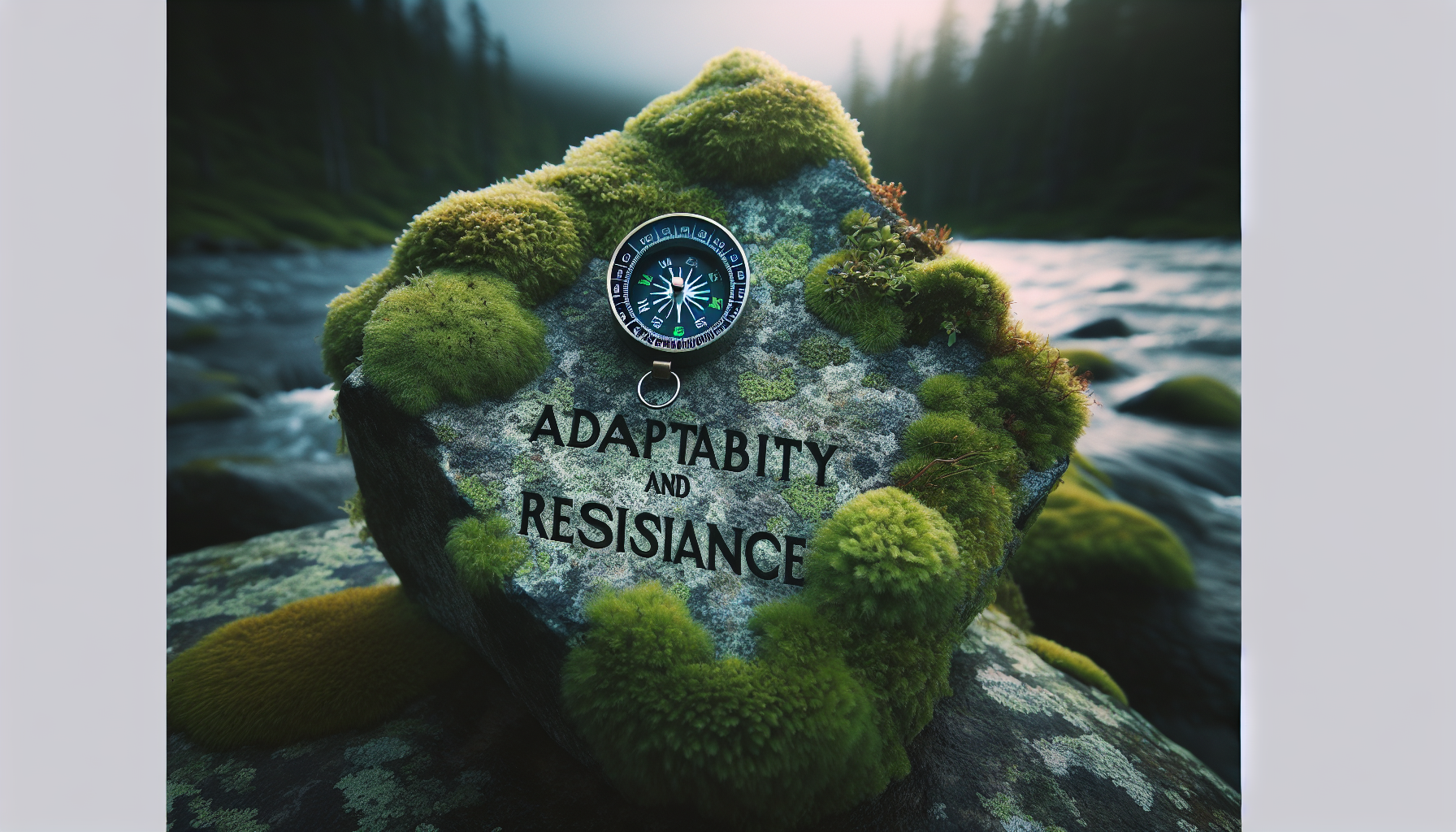Imagine a person who possesses the skills to adapt and conquer the toughest challenges thrown their way, be it the unpredictable forces of nature or the collapse of society as we know it. This individual is a true survivalist – someone who combines resourcefulness, knowledge, and an unwavering determination to thrive in even the most dire circumstances. But what exactly defines a true survivalist? Is it the ability to start a fire from scratch or the knowledge of gathering edible plants in the wild? Stay tuned as we explore the characteristics that make up a true survivalist and unveil the secrets behind their remarkable resilience.

Definition of a True Survivalist
A true survivalist is an individual who possesses the necessary skills, mindset, and knowledge to navigate and thrive in extreme and challenging environments. They are self-reliant, adaptable, and resourceful, able to overcome various obstacles and emergencies with confidence and resilience. A true survivalist is not only physically adept but also mentally strong and possesses a deep understanding of the natural world. They prioritize preparedness, community building, and ethical conduct, making them a valuable asset in any survival situation.
Surviving in Extreme Conditions
Surviving in extreme conditions is one of the core abilities of a true survivalist. Whether it be the intense heat of a desert or the freezing temperatures of a snow-covered wilderness, they have the skills and knowledge to endure and thrive in such environments. From understanding how to regulate body temperature to identifying natural shelters and water sources, these individuals are well-equipped to face the challenges posed by extreme conditions.
Self-Reliance and Independence
Self-reliance and independence are crucial traits of a true survivalist. They possess the ability to rely on themselves without constantly seeking external assistance. They have honed their skills to procure food, water, and shelter from their surroundings, minimizing their dependence on modern amenities. These individuals are prepared to face emergencies and continue their survival journey with little to no external support.
Adaptability and Resourcefulness
Adaptability and resourcefulness are vital qualities of a true survivalist. They have the ability to quickly assess a situation, adapt their strategies, and utilize the available resources effectively. Whether it’s crafting tools from natural materials, finding alternative sources of energy and food, or improvising shelter in unconventional ways, these individuals possess the creativity and ingenuity to overcome any obstacle that comes their way.
Skills of a True Survivalist
Wilderness Navigation
Wilderness navigation is an essential skill for a true survivalist. They possess a keen understanding of maps, compasses, and other navigational tools. Additionally, they can navigate using natural landmarks, celestial bodies, and environmental cues. With these skills, they can confidently traverse unfamiliar terrains, ensuring they reach their intended destinations safely.
Fire Starting and Shelter Building
The ability to start a fire and construct a suitable shelter are fundamental survival skills. A true survivalist knows how to select appropriate fire-starting materials, utilize various fire-starting methods, and maintain a sustainable fire for warmth, cooking, and signaling purposes. Additionally, they possess the knowledge and skills to construct different types of shelters, such as debris huts, lean-tos, or improvised tents, using the available natural resources.
Water Procurement and Purification
Water procurement and purification skills are critical for a true survivalist. They can efficiently locate and collect water from natural sources, such as rivers, streams, and springs. They also possess the knowledge and techniques required to purify water using filtration, boiling, or chemical treatment methods, ensuring it is safe for consumption.
Food Foraging and Preparation
A true survivalist understands the principles of food foraging and preparation. They can identify edible plant species, mushrooms, and other wild food sources. Additionally, they possess the skills to safely harvest, process, and prepare these resources to sustain themselves in the wild. They also have knowledge of basic hunting and trapping techniques to procure animal protein when necessary.
First Aid and Medical Skills
First aid and medical skills are invaluable for a true survivalist. They possess a comprehensive understanding of basic first aid procedures, including wound management, splinting, and CPR. They are knowledgeable about natural remedies, herbal medicines, and alternative healing methods. With these skills, they can effectively respond to injuries, illnesses, and emergencies, ensuring the well-being of themselves and others in their group.
Mental Strength
Calmness and Ability to Manage Stress
A true survivalist possesses the mental strength to remain calm and composed in high-stress situations. They can accurately assess risks, make rational decisions, and take appropriate actions without succumbing to panic. Their ability to manage stress allows them to think clearly, solve problems efficiently, and adapt to changing circumstances effectively.
Positive Mindset and Determination
Maintaining a positive mindset and unwavering determination is a crucial aspect of mental strength for a true survivalist. They possess a strong sense of resilience and optimism, enabling them to stay motivated even in the face of adversity. This positive attitude fosters perseverance, allowing them to overcome challenges and setbacks during their survival journey.
Problem-Solving and Critical Thinking
Problem-solving and critical thinking are essential skills for a true survivalist. They can quickly assess a situation, identify potential threats and challenges, and develop efficient strategies to mitigate them. Their ability to think critically enables them to analyze complex situations, evaluate different options, and make well-informed decisions. They can adapt their plans and tactics based on the ever-changing circumstances encountered in survival scenarios.
Physical Fitness
Endurance and Stamina
Endurance and stamina are vital physical attributes of a true survivalist. They possess the ability to sustain prolonged physical exertion, allowing them to undertake long journeys, engage in physically demanding tasks, and persevere through challenging conditions. Their well-conditioned bodies can endure harsh environments and arduous activities, ensuring they can continue their survival efforts without succumbing to fatigue.
Strength and Conditioning
Strength and conditioning are essential elements of physical fitness for a true survivalist. They possess the muscular strength necessary for activities such as carrying heavy loads, constructing shelters, and defending themselves if required. Additionally, they maintain overall physical fitness through regular exercise and conditioning routines, ensuring their bodies are primed for the demands of survival situations.
Agility and Flexibility
Agility and flexibility play a significant role in the physical prowess of a true survivalist. They possess the ability to move swiftly and navigate through challenging terrains. Their flexibility allows them to perform tasks that require bending, stretching, and reaching comfortably. By maintaining these attributes, they can maneuver efficiently in various survival scenarios, adapting to the unpredictable nature of their environments.

Knowledge
Wilderness Survival Techniques
A true survivalist possesses extensive knowledge of wilderness survival techniques. They understand various shelter construction methods, fire-starting techniques, and water procurement strategies specific to different environments. They are aware of potential hazards and dangers posed by wildlife, weather, and natural phenomena, and they know how to mitigate these risks effectively.
Plant and Animal Identification
Plant and animal identification is a critical aspect of a true survivalist’s knowledge base. They can identify edible plants, medicinal herbs, poisonous species, and potentially dangerous wildlife. Moreover, they understand the ecological relationships between different organisms, allowing them to make informed decisions regarding foraging, hunting, and potential threats posed by predators.
Weather Patterns and Natural Phenomena
A true survivalist possesses a deep understanding of weather patterns and natural phenomena. They can interpret cloud formations, wind patterns, and other atmospheric cues to predict upcoming weather conditions. This knowledge allows them to make informed decisions regarding shelter, clothing, and travel plans. They are also aware of the potential dangers associated with natural phenomena such as flash floods, avalanches, or earthquakes.
Basic Engineering and DIY Skills
Basic engineering and DIY skills are valuable assets for a true survivalist. They possess the ability to construct simple tools and equipment using natural materials. Whether it’s fashioning a makeshift fishing spear, crafting a snare trap, or building a durable raft, they can utilize their knowledge of physics and engineering principles to create practical solutions to survival challenges.
Preparedness and Planning
Stockpiling Essential Supplies
Preparedness is a key aspect of a true survivalist’s mindset. They are proactive in stockpiling essential supplies, including food, water, medical provisions, and tools. They have a well-thought-out inventory of items tailored to their specific survival needs. By maintaining an adequate supply of resources, they can ensure their immediate needs are met while continuing to focus on self-reliance and sustainable practices.
Creating Emergency and Bug Out Plans
Creating emergency and bug-out plans is crucial for a true survivalist. They have developed comprehensive strategies to respond to different scenarios, including natural disasters, civil unrest, or personal emergencies. These plans outline evacuation routes, rendezvous points, communication protocols, and contingencies. By having well-prepared plans in place, they can act swiftly and efficiently during times of crisis.
Risk Assessment and Mitigation Strategies
A true survivalist possesses the ability to assess risks and develop effective mitigation strategies. They understand the potential dangers associated with their environment and can identify potential hazards before they become significant threats. They take proactive measures to minimize risks, such as identifying safer travel routes, establishing secure shelter locations, and practicing situational awareness.

Environmental Awareness
Leave No Trace Principles
A true survivalist adheres to the “Leave No Trace” principles, which emphasize minimizing environmental impact while in the wilderness. They understand the importance of preserving the delicate balance of ecosystems and ecosystems’ sustainable practices. They avoid damaging natural resources, respect wildlife habitats, and properly dispose of waste. By practicing these principles, they ensure the long-term preservation of natural landscapes for future generations.
Conservation and Sustainable Practices
Conservation and sustainable practices are integral to a true survivalist’s mindset. They understand the limited availability of natural resources and strive to use them judiciously. They prioritize practices such as responsible hunting and fishing, selective plant harvesting, and reducing waste. By fostering a sustainable approach, they ensure the longevity of their survival efforts and contribute to the overall preservation of the environment.
Understanding Local Ecosystems
A true survivalist possesses a deep understanding of local ecosystems. They are familiar with the native flora and fauna, ecological patterns, and seasonal variations. This knowledge allows them to adapt their survival strategies accordingly, taking advantage of available resources and avoiding potential hazards. Understanding the dynamics of the local ecosystem enables them to establish harmonious relationships with their surroundings while optimizing their chances of survival.
Adaptability to Different Situations
Natural Disasters
A true survivalist possesses the adaptability to navigate and cope with natural disasters. They understand the specific challenges associated with events such as hurricanes, earthquakes, tornadoes, or floods. They have the knowledge and skills necessary to secure shelter, gather essential supplies, and respond appropriately to the dangers posed by these disasters. Their ability to adapt quickly allows them to minimize risks and increase their chances of survival.
Urban Survival
Adaptability in urban environments is a crucial skill for a true survivalist. They understand that survival scenarios can extend beyond the wilderness and into urban settings during emergencies or societal breakdowns. They possess the skills to navigate crowded areas, scavenge for resources, and identify secure locations. Their ability to blend in and adapt to changing urban dynamics ensures their safety and survival in challenging urban scenarios.
Surviving in Remote Locations
A true survivalist has the adaptability to thrive in remote and isolated locations. They understand the unique challenges posed by limited access to resources and minimal human presence. They possess the skills to procure food and water from the natural environment, construct sturdy and sustainable shelters, and maintain their physical and mental well-being in the absence of external support. Their adaptability allows them to flourish in remote regions and sustain themselves for extended periods.

Community Building
Teaching and Training Others
Community building is an integral part of a true survivalist’s philosophy. They actively share their knowledge and skills with others, teaching and training individuals to become self-reliant and prepared for survival situations. By empowering others, they contribute to the formation of a resilient and capable community, capable of facing challenges collectively.
Collaboration and Teamwork
A true survivalist understands the value of collaboration and teamwork. They possess the ability to work effectively with others, pooling resources, skills, and ideas to achieve common goals. By fostering teamwork and fostering a spirit of cooperation, they increase their chances of survival and promote a sense of unity among individuals facing adversity.
Cultivating Relationships and Networks
Cultivating relationships and networks is an important aspect of community building for a true survivalist. They establish connections with like-minded individuals, forming alliances and support systems. They participate in survivalist networks, attend workshops and conferences, and engage in forums and social platforms to connect with fellow survivalists. By expanding their network, they gain access to a wider range of skills, resources, and knowledge, strengthening their overall preparedness and survival capabilities.
Ethics and Morals
Respecting Nature and Wildlife
A true survivalist demonstrates a deep respect for nature and wildlife. They understand the importance of coexisting harmoniously with the natural world, respecting the habitats and well-being of all living creatures. They engage in sustainable practices, refrain from over-hunting or over-harvesting, and leave minimal impact on the environment. Their ethical conduct ensures the preservation of ecosystems and the welfare of wildlife.
Helping Others in Need
Helping others in need is an essential aspect of a true survivalist’s ethical framework. They prioritize the well-being and safety of others, offering assistance and support whenever possible. Whether it’s sharing resources, providing medical aid, or offering guidance, they are committed to helping individuals facing hardship or emergencies. By demonstrating compassion and selflessness, they create a positive impact in their communities and embody the true spirit of survivalism.
Maintaining Integrity and Honesty
Maintaining integrity and honesty is a core value of a true survivalist. They adhere to a strong moral compass, conducting themselves with honesty, transparency, and accountability. They uphold their commitments and respect the rights and boundaries of others. Their integrity ensures that they are trusted members of their communities, fostering a sense of unity and cooperation among fellow survivalists.
In conclusion, a true survivalist encompasses a wide array of skills, qualities, and knowledge that enable them to navigate and thrive in challenging and extreme conditions. From physical prowess and mental resilience to a profound understanding of the natural world and ethical conduct, they embody the essence of preparedness, adaptability, and self-reliance. By embracing these traits and developing their abilities, individuals can become true survivalists capable of confidently facing any survival scenario.
